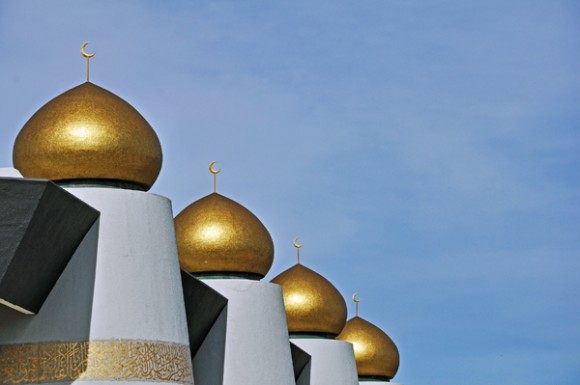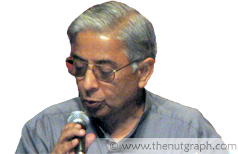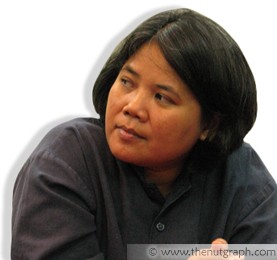ACCORDING to MCA president Datuk Seri Dr Chua Soi Lek, Malaysia has much to fear if the Pakatan Rakyat (PR) takes power federally. Chief among his many worries is PAS’s avowed agenda to establish an Islamic state and impose hudud. The Barisan Nasional (BN) has also run a series of advertisements demonising PAS over the hudud issue and imploring Malaysians to “vote wisely”.

Can PAS implement hudud if the PR comes into power? (dcubillas / sxc.hu)
The BN attacks on PAS’s hudud agenda involve scaremongering of the worst kind, pitting Malaysians of different faiths against each other and causing unnecessary fear and suspicion. It is particularly despicable since Umno-owned Utusan Malaysia is constantly warning Malay Malaysians that the DAP controls PAS, and that Chinese Malaysians will rule the country to their detriment if the PR takes power. Rather than hold PAS accountable to their hudud goals, which may risk angering Muslim Malaysians, the MCA instead chooses to demonise the DAP for associating with PAS.
The BN’s alarmist politics aside, can hudud law actually become a reality for Malaysians? And how likely is it that it will be implemented in the near future?
Legal issues
Hudud generally refers to a specific list of offences and punishments. The Kelantan and Terengganu hudud enactments, which are not yet in force, recognise six offences – theft, robbery, illicit sex, unproven accusations of illicit sex, alcohol consumption and apostasy. It also prescribes specific punishments such as amputation of the right hand for theft, and 100 cane strokes and one year’s imprisonment for illicit sex.
The constitution currently grants states the power to enact offences against the precepts of Islam but only over persons professing Islam.[1]

Shad Saleem Faruqi
“To implement hudud on non-Muslims, there needs to be a constitutional amendment requiring a two-thirds majority in Parliament,” constitutional expert Emeritus Professor Datuk Dr Shad Saleem Faruqi tells The Nut Graph in a phone interview. “It may also require the consent of the Conference of Rulers under Article 159(5) of the Constitution.”
It is also arguably unconstitutional for hudud in its entirety to be implemented on Muslims. Federally, Parliament cannot enact Islamic criminal laws as that is under state jurisdiction. But, at the state level, states do not have carte blanche to do as they please. They can only enact matters as contained under the State List, and which do not conflict with federal law. Crimes such as theft and rape, contained in the federal Penal Code, thus cannot be enacted by the state.
Also, the punishments meted out under state syariah law cannot exceed what has been set out under federal law. This is governed by the Syariah Offences (Criminal Jurisdiction) Act 1965, which prescribes a maximum sentence of six strokes, RM5,000 fine and/or three years’ jail.
Already crimes
Having said that, crimes such as apostasy, illicit sex and alcohol consumption are not federal crimes and are already illegal in many states, including those under the BN. Thus, some of the acts which hudud law would criminalise are already crimes, although the punishment is limited by the 1965 Act.
The Pahang Syariah Court, for example, sentenced Kartika Sari Dewi Shukarno in 2009 to six cane strokes and a fine of RM5,000 for drinking beer, although the caning was later commuted. In 2010, three women were imprisoned for at least a month and caned up to four to six times in Kajang Prison for illicit sex.

Kartika
Shad Saleem confirms that the maximum sentences currently set by the 1965 Act can be increased by a simple majority of those present and voting in Parliament. If, for instance, Parliament were to increase the maximum sentence to 100 cane strokes, and state enactments followed suit, a person could theoretically be found guilty of illicit sex and sentenced to 100 strokes, as stipulated in the hudud enactments respectively passed by the PAS-led Kelantan and Terengganu governments in 1993 and 2002.
Shad Saleem states that punishments under the Penal Code can also be amended with a simple majority. However, it cannot be stated that hudud or Islamic law is being implemented, as that would be unconstitutional.
Will PAS do it?
As the numbers stand, PAS by itself cannot make hudud a reality even if the PR comes into power following the 13th general election that will be held on 5 May 2013. PAS is contesting 73 out of 222 seats, far from even a simple majority. PAS would require the assistance of their PR counterparts, or, even possibly, an Umno opposition eager to prove their Islamic credentials.
Political scientist Wong Chin Huat is of the view that hudud would not be a top priority for a newly formed PR federal government. “This is not so much a theological issue as a political one,” he says in a phone interview.
Wong says what drives the hudud agenda is ethnic politics and the necessity to differentiate one’s party from the others. For so long as PAS does not have power federally, its hudud agenda is a means of “product differentiation” in the game to outdo Umno. But once in power, the need to run the country and the resources available at one’s disposal provide greater incentives to be moderate.
“Other priorities will arise, such as the need to maintain the economy, and not drive away tourists and investors,” says Wong.
Wong, however, states that in the event that the PR takes power, a “desperate”, unelectable Umno may keep the hudud agenda alive by taking up the Islamist mantle as it would no longer have an incentive to appear moderate. This would lend support to the conservatives within PAS and continue to fuel the hudud debate and the bid to out-Islamise one another, which has been ongoing for decades between PAS and Umno.
Wong says reintroducing local elections would help stave off this likelihood. Why? Because Umno would then have some possibility of taking power locally, and would again have the incentive to appear moderate and appeal to a wider section of society.
Mindset

Norhayati
Ultimately, however, whether or not hudud becomes a reality in Malaysia will depend very much on what Malaysians want. Muslim women activist and filmmaker Norhayati Kaprawi recalls a Merdeka Centre survey which found that about 70% of Malaysian Muslims supported Kartika’s caning sentence.
“People think because it is part of hudud, caning is Islamic. But they forget what justice is all about,” Norhayati says in a phone interview. “Why should only this woman be caned when it’s a known fact that many Muslims drink? Why was Kartika singled out?” she asks.
Norhayati points out that Kartika was a first-time offender, and was not drunk or causing trouble. Yet she was given the maximum fine and a caning sentence as if she had committed the biggest syariah offence. “This very punitive mindset is what worries me. From media comments, the mentality seems to be that the purpose of hudud is to impose the harshest punishment,” Norhayati says.
She points out that this mindset didn’t just come about because of PAS. It’s the result of what has been an inexorable process of Islamisation in Malaysia for which Umno, PAS, and Islamic state and non-state actors have been responsible.
Norhayati also disagrees with the reassurance that hudud would not affect non-Muslims. “This sort of call is irresponsible. It is polarising – asking one segment of society not to bother with the other.” Furthermore, she says it is inaccurate to say hudud will not impact non-Muslims. “Based on PAS’s current hudud enactments in Kelantan and Terengganu, only Muslim males are eligible to be court witnesses. The testimonies of non-Muslims (and also Muslim women) are not accepted in PAS’s hudud-style Islamic courts. How can that court operate in a multi-religious society like Malaysia? What if a non-Muslim is robbed by a Muslim?”
Ultimately, whether or not hudud becomes part of Malaysian law will depend very much on its people. Politicians, after all, are sensitive to the electorate’s demands. If there is serious disagreement among Malaysian citizens over hudud, we need to be able to talk about it openly, knowledgeably and reasonably.
The BN’s advertisements and campaign in this election have clearly made that difficult to happen. Indeed, neither the BN nor the PR have been discussing the hudud issue objectively, choosing instead to politicise it for partisan gain. Can the PR do a better job of opening up a truly democratic space for hudud to be discussed intelligently and rationally? That’s left to be seen. But it may just be the time to give them the chance to try.
[1] Federal Constitution, Ninth Schedule, State List, Para 1
- Nut Graph



No comments:
Post a Comment
Note: Only a member of this blog may post a comment.